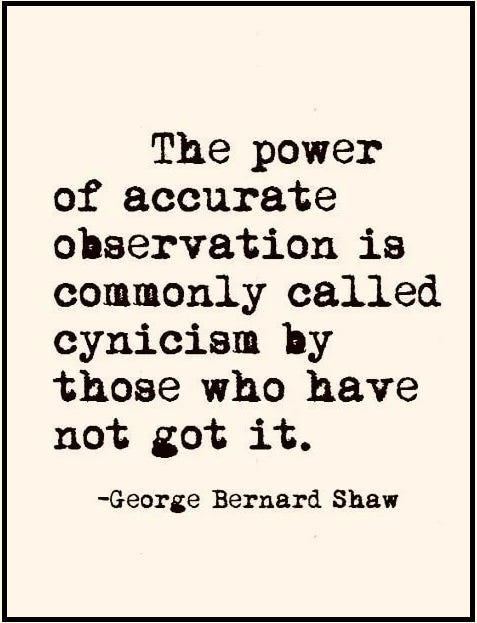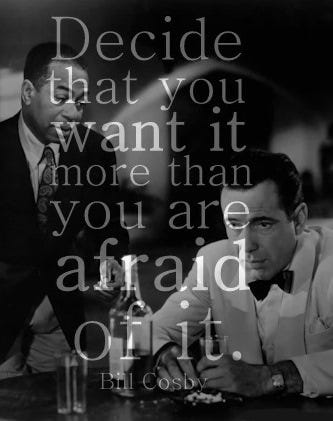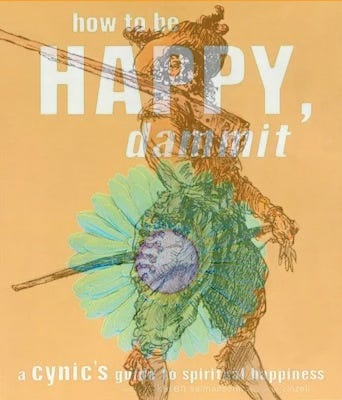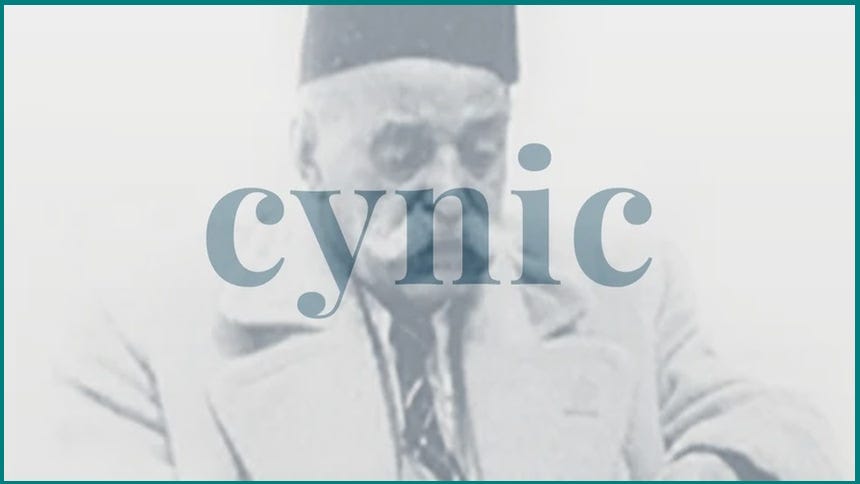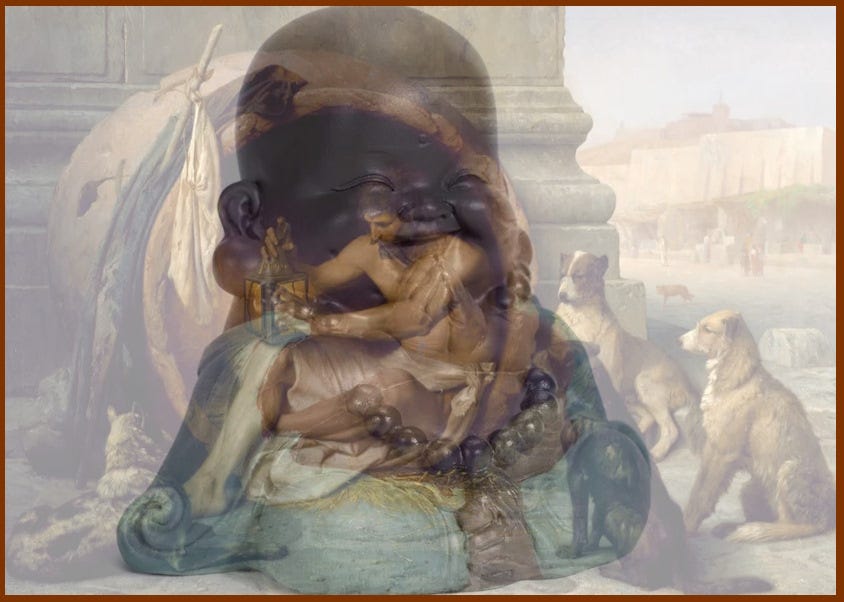(I promised to make a shorter, lighter article this time — so here’s what you get! As always there’s an entertaining audio version for paid subscribers.)
Q: Are you becoming more cynical as you get older?
I. WELCOME TO THE NEW CYNICISM
I’ll tell you what I’d like to be becoming: post-post-cynical. Is that an option? Could we even recognize a metamodern reboot of cynicism?
Such a possibility seems elusive in the extreme. Some rough feeling of disagreement exists between the aspirational ideals of the New Ethos (i.e. liminal, integrative, transformational, developmental, Game B, regenerative metamodernity) and our popular assumptions about cynical moods. They rub each other the wrong way.
A lot of folks who overlap into these delicious new social networks are saturated in sincerity, touched by trust, synchronized with neo-spiritual resonances, eagerly enthused about authenticity, “like totally” into integrity & convinced of the intrinsic reality of Value. We are warriors, sages, and midwives for the much-needed regeneration of humane meaningfulness. And for a world in which our hearts can actually thrive. Hallelujah!
Today, (already a quarter of the way through the 21st century) there is a big bunch of these people. Growing numbers of lucky, sensitive, well-balanced, and cognitively sufficient characters who have fallen into the happy meta-hobby of positivistic omnivalidation. All persons? All perspectives? All paradigms? Yes, please!
We seem to get off on including and honoring all values. And when that charming thrill wanes, we just “go meta” on ourselves and start integrating all the critiques of inclusivity. All perspectives are partially valid, we say, but not equally so!
We are like buzzing bees in a strange new hive who are busily postulating a grand, evolving, nondogmatic, non-reductionistic, non-regressive, values-orientated, science-friendly, faith-friendly, post-pluralistic nondualism with practical instantiations.
Where is there any room, in all of that, for a new cynicism?
Well, for one thing, we should probably be emotionally capable of facing our collective creative challenges with a tragic disposition. Perhaps we will fail. Certainly, we will die. This may all be doomed — but we will do it anyway. There is something sober and heroic about that attitude.
So cynicism could help us flirt with tragic realities. It may also be needed to keep our teeth. I mean: to keep our ability to bite, to critique, to challenge each other, and to work beyond the boundaries of our safe, sensitive & supportive trust-developing spaces. Those of us who take many perspectives, and engage in rigorous emotional self-exploration, often become hypersensitive to non-supportive conditions. Good. But we may still need to remember how to fight or how to play the role of “going all in” on an unfair, critical over-simplification. What if it turns out that we need our negativity, anger, and suspicion for something?
Maybe a deeper experience of cynicism is the only way to really under the experience of marginalized and disenfranchised groups (and/or cognitive styles) that nonetheless have to pretend to be normal positive members of the hegemonic society?
Cynicism also might notice that our so-called “leading-edge” values sound like a very contemporary, Western, even “American,” attitude. Our intuitions do not arise in a vacuum. They are embedded within the political and commercial and media realities of the time & place in which we are raised. There are real connections between the self-serving systems that form the background atmosphere of our dominant society and our emerging, convincing new ideals.
Is the philosophy of super-inclusion not suspiciously similar to the neo-liberal politics of respectful tolerance? Or to the pervasive old corporate ethos that “the customer is always right?” Could these be the secret source of our perspective-embracing integrative ideals? Some cynicism may be needed.
And what else might stand out to us through the lens of a new cynicism?
Are we mistaking mere adaptation-to-new-technologies for some higher human maturation or fantastical “rising level” of consciousness?
Are our attempts to produce trans-binary integrative syntheses of human values hopelessly skewed and sabotaged by our naive belief that people actually hold the values that they passionately articulate?
Is “consciousness” as significant as our saints and theorists have unthinkingly assumed — or might it be a relatively trivial aspect of our existence?
Don’t be sad. It could all work out!
But we must rely on a cynical instinct to help keep us sane during all our self-evolving, world-saving & mutuality-deepening activity. We also need to liberate our hearts from the anxiety that drives us to “stay positive” and “believe in something” and “care about everything.”
We burn a lot of subconscious energy trying to avoid slipping into depression, numbness, cynicism, inaction, grief, bewilderment or “limiting stories.” Maybe let that resistance turn off. Maybe just feel bad for a while. Relax into heartbreak. Own your cynicism.
Then use your internal energy savings to get back to work.
(If you want to stop reading now, the repeating message of this article will be that we need a good conscience about cynicism — which can then help us embody our natural cynical spirit with an uncontracted heart. )
Cynicism is not the same as depression, triviality, and immobilization. We have social “crises” of anxiety, depression, overwhelm, social disempowerment, malnourishment, degraded friendship networks, etc. but these have distinct causes and should be teased apart from the cynical possibility of a vivifying skeptical disinterest in social idealism (& a casual hyper-alertness about the ever-expanding pervasiveness of deception, miscalculation and manipulation in a bio-digital planetary epoch).
Cynicism shows us what we might not need. For example:
You can still meditate even if your yoga teacher turns out to be a pedophile.
You can still have transformative life-altering visions of Christ, Muhammed or Krishna even if it turns out that they never existed.
You still need community spirit & collective action even if it is based on a lie.
So it goes.
A proactive metamodern cynicism is a doubled affect. The founder of Surrealism, Andre Breton, once wrote that “criticism should be an act of love.” Cynicism can also be an act of love. Integrative, self-aware, oscillatory beings (like us?) are uniquely capable of generating these kinds of hybrid sensibilities.
The metamodern notion of sincere irony is one example. Nietzsche’s call for la gaya scienza (a culturally revitalizing mixture of cheer and skepticism, joy and deconstruction, science and play) is another example. You may be able to add some others to this list.
Cynicism hath a glorious past and mayhap a necessary future.
II. DON’T PRETEND YOU KNOW WHAT IT MEANS
Stoicism is rising. Stoicism has been enjoying (assuming Stoics are capable of enjoyment) an interesting post-millennial resurgence. Good for them. On the other hand, however, we still typically use the term “cynic” as a marginalizing epithet. We denounce cynicism surprisingly blithely. Try saying that three times quickly! Do we not feel completely entitled to ignore someone’s perspective if they are “just a cynic?”
Each major political movement accuses its rivals of cynicism. Metamodernists must rush to distinguish themselves from the accusation of being merely postmodern cynics. And even our best new scholars of classical philosophy, who are learning to re-appreciate the ancient Athenian Cynics, still reserve the right to shit all over today’s cynical thinkers, cynical moods, and cynical forms of entertainment.
Somehow we feel oddly sure that we (a) know what cynicism is, and (b) correctly perceive its obviously negative value. Very suspicious. To experimentally challenge this, let’s explore a few kinds of cynicism to enrich our understanding. We will start with the classics:
Anciently, on a wild windy Wednesday, there was a Hellenic philosophical sect known as the Dogs (Cynos). Conventional European philosophical history connects this movement with sage-like guys like Antisthenes, Diogenes & Crates of Thebes. Why were they called dogs? Several stories exist.
A common tradition holds that they held their discussions at a gymnasium called The White Dog. It is also said that their founder belonged to a particular social class known as White Dogs — ethnically privileged but lacking many basic citizen’s rights. Or maybe it was just because Diogenes lived in a fucking public barrel like a dog.
Diogenes was an avant-garde performance artist who, purportedly, said, “Other dogs bite their enemies but I bite my friends to keep them awake.”
These original Cynics were cosmopolitan, Socratic & idiosyncratic. Idiosocratic? Hmmm. Diogenes famously described himself as a “citizen of the world” and for many people in ancient times, he symbolized a humane trans-cultural alternative to the transnational globalist militarism embodied by (the not-necessarily-that-Great) Alexander of Macedon.
In addition to being cosmopolitan, these Cynics were naturalists who looked to complex, quasi-Taoist natural dynamics for insights into the development of virtue — in opposition to mainstream social assumptions about wisdom and self-cultivation.
Cynics aligned themselves with a civic-oriented ethic of individual sovereignty (autarkeia), antifragility, and the independent production of values and concepts. They practiced direct spiritual exercises (askesis) and cultivated anaidea (shamelessness) — making a deliberate struggle with embarrassment, social friction, and the counterproductive fragility of most forms of faddish social decorum. I am inclined to view this not only as a sensible approach to individual existential development but also as a disruptive shamanic service to the Polis.
It is said that Cynics leaned into the virtue of ponos (work) and agon (self-struggle & cognitive dissonance). They championed satire (humorous body-based social critique) and parrhesia (open, even risky, public speech). And all of this within a general frame of adiaphora — a precautionary nondualism that anticipates deception, reversals, flux & complexity with a good conscience.
Okay, that’s enough sexy arcane philosophical terminology about how they used to do it Greek style! All we’re trying to say is that these ancient Cynics fought a spiritual battle to separate organic goodness from mere social idealism. To tease apart living sacredness from faux-sacred populist moralizing and emptied rituals. They were hybrids of philosophy, comedy & antifragility who moved back and forth across the membrane that separates the esoteric from the mainstream.
Sounds pretty good.
But on the other hand — what do you care?
III. LE POST-CYNIQUE, C’EST MOI !
Here’s something cynical about me:
I would not join any group that is eager to convince me that it is (definitely) not a cult. Methinks they doth protest too much. Like when the band Sublime claims, in the first line of that song, that they DON’T practice Santeria (1996). Clearly a lie. Or to quote Captain Frank Lapidus from the TV Show LOST, “In my experience the people who go out of their way to tell you that they’re the good guys — are the bad guys.”
But I don’t think this cynicism is the result of me being wounded or excessively deceived. I haven’t had my idealism crushed. On the contrary, I suspect my suspicion about the “expressions of virtue and persuasiveness” comes from the fact that I am not starving for meaning.
I do not feel a desperate need to be convinced. I do not feel so separate from virtue & energy & meaningfulness that I must be super careful not to accept any negative narratives or any flatland world without narratives at all. Perhaps I feel such angst somewhat in my personal relationships but not when it comes to the so-called public sphere.
Cynical disbelief need not be the result of vulnerable believers discovering that they have been hoodwinked. It could simply be a nonchalance about belief itself. Metamodern cynicism might have to be something of that kind.
Although, to be fair, cynicism is also a natural response to an era in which the tools for manipulative persuasion are greater and more penetrating than ever. Not to mention the fact that we have made a lot of neat discoveries in the last 50 years about the cognitive biases of the evolved human brain. So as we attempt to cultivate a new kind of civilization, we need a supportive cynicism that suspects deception very acutely — and learns very deeply about our own patterns of error and gullibility. We are all dumb in some weird ways. Therefore we all need to be better (and more graceful) at suspicion.
French philosopher Paul Ricoeur described Marx, Freud & Nietzche as masters of suspicion. These thinkers helped give birth to an age of decoding and “hermeneutics” in which we must look for patterns beyond the typical categories, intentions, and nominal content of human communication.
Karl Marx famously suspected that many of our individual opinions and values were inauthentic imports sourced in the socio-economic systems in which we are embedded. Sigmund Freud reckoned that most reasoning is just rationalizing — and that our conscious choices constantly hint at their distortion by unconscious structures.
And Nietzsche? Well, that’s complicated.
Here’s the kind of thing he typically said:
Whoever, in intercourse with men, does not occasionally glisten in all the green and grey colours of distress, owing to disgust, satiety, sympathy, gloominess, and solitariness, is assuredly not a man of elevated tastes. Supposing, however, that he does not voluntarily take all this burden and disgust upon himself, that he persistently avoids it, and remains, as I said, quietly and proudly hidden in his citadel, one thing is then certain: he was not made or not predestined for knowledge.
For as such, he would one day have to say to himself: "To hell with my good taste! The “normal” is more interesting than the exception — the exception who is myself!" And then he would go down, and in, and among them. The long and serious study of the average person, which necessarily involves much disguise, self-overcoming, and bad company (for all company is bad except with one's peers) — that task constitutes an essential part of the life-history of every philosopher even if it is the most disagreeable, odious, and disappointing part. If he is fortunate, however, as a favoured child of understanding should be, he will meet with suitable research subjects who will make his task much quicker and easier. I mean the so-called cynics. Those who simply recognize the animal, the commonplace and "the rule" in themselves, and at the same time have so much spirituality and ticklishness that they must talk about all this in front of witnesses.
[…] Cynicism is the only form in which base souls approach what is called honesty; and the higher man must open his ears to all the coarser or finer cynicism, and congratulate himself whenever a clown becomes shameless in front of him, or when a “scientific” satyr speaks. Whenever anyone speaks without bitterness, quite innocently, […] wanting to see hunger, sexual instinct, and vanity as the real and only motives of all human actions; in short, when any one speaks "badly" (and not merely "ill") of humanity, then the lover of knowledge must hearken attentively and diligently....
Beyond Good & Evil - II: 26
For Nietzsche, the cynic is not a denier (a wounded idealist) but a revealer. One who speaks non-idealistically but without indignation. One who is immune to “spin” and who can therefore provide rich information about how most people really feel underneath all their training in “loyalty” and “culture” and “saying good things.” This kind of cynic, who is certainly not the end of the story, must nonetheless be invited to the table if wisdom is being sought.
Many other cynicisms could also exist. Since the post-postmodernists are so eager to build evolutionary ladders, we could even look at it through that kind of stacked, emergent lens. Traditional, modern, and postmodern cynicism could be integrated within metamodern cynicism. What are these things like?
Traditionalist cynicism might be the attitude of an outdated religious network, isolated ethnic minority, or immature loner within a modern society. Despite the fact that they drive to work, use the bank & own computational devices, it is all experienced through a cynical distance. The modern society in which you are embedded is felt as a misguided, misleading, or malicious Other. You are sympathetic to people who might even propose violent means to destroy this mistaken form of life and resurrect the inherited purity of the 19th or 13th century.
Modernist cynicism is almost the reverse. It reminds me of Rene Descartes’ written prologue to his geometrical & doubt-based philosophy. He tells an intriguing story about his time as a soldier during the Thirty Years War. After traveling and staying in so many foreign places, with such strange customs and diverse languages, he discovered — upon returning to his homeland in France — that their traditions seemed just as arbitrary and outlandish as all the others. It was still his land, his people, but so what? It could just as well be any other set of stupid local ideas and passionate customs.
He continues to play along, follow the rules, and attend the festivals but his participation is now rooted in a critical distance from (and basic disinterest in) the particular forms of culture, family, nation & creed. Like Diogenes the Cynic, Descartes was now, at least in some ways, a citizen of the world.
Postmodern cynicism is a richer thing. One is no longer just emotionally wary and intellectually skeptical about the values of traditional knowledge. Knowledge Itself now seems suspiciously partial, interpreted, manipulative, and always being “used” for something. Should we trust that sentences themselves reveal more than they conceal? Is science an Illuminati plot? Are numbers an artifact of the patriarchy???
You could go mad or become dangerously enervated (good word) from such thinking but that is not a necessary outcome. If you pushed a little further into this kind of free-floating, omnidirectional cynicism it might completely reverse its affective energetic signature.
Isn’t your Relativism also an Absolutism that you assert as part of some dubious power drive or subconscious biopolitical agenda?
How can you possibly believe in the naive, pre-deconstructed validity of your own emotional and moral responses to the injustice of the existing hegemony?
And suppose you even feel there is no ultimate meaning? Aren’t your choices about what to do with your “meaninglessness” secretly prescribed by the dominant ideology?
There is, perhaps, a good metamodern argument that postmodern cynicism simply does not go far enough. But far enough for what? Far enough to apply to all things including oneself. Far enough to separate itself from any simplistic patterns of socio-emotional reactivity that recoil, crouch or numb themselves instead of experiencing the full vulnerability of our shared situation.
To this stack of historical cynicisms, we might want to add psychedelic cynicism (the post-trip demotion of the centrality of everyday neurochemical perceptions about reality and possibility). We probably should also add big data cynicism. When Kinsey, and Masters & Johnson released their reports on sexual behavior in the mid-20th century, it turned out that most normal people were engaged in activities that the mainstream culture considered to be “fringe perversions.”
The simplified idealism and dominant social narratives were punctured and undermined simply by having more information about reality. Following the data, like following the money, is a recipe for a healthy and truth-based cynicism toward whatever socialized people would like to assert about themselves in front of others.
And might there not be something like a Taoist cynicism? The pro-Tao Danish physicist Niels Bohr famously claimed that, as a scientist, he does not believe in magical “good luck” horseshoes but, he added, apparently, they work even if you don’t believe in them. Is that a kind of cynicism? A cynicism of magic?
What else might work just fine (or maybe better) even if you don’t believe in it?
Value? Meaning? Spirit?
I sound playful but these are serious questions. What if people have a better relation to the Divine by not believing in it? What if your many small efforts to live & purchase “green” have been making the ecological problem worse? What if your spontaneous moral intuitions are designed to keep things from getting better?
We could ask thousands of questions like this and they all require to risk the possibility of cynicism in order to explore reality more deeply. How many sacred things and positive developments have we been holding back because we’ve been viewing everything upside down?
[Gurdjieff] went on to say that I, like most young people, especially Americans, always looked at the world upsidedown. For example I always assumed that anyone I met was good, honest, upright, etc. and only learned the truth through disillusion. This attitude was a long, slow and improper process. "You must learn to look right side up," he said. “Every person you see, including yourself, is shit. You learn this. And then, when you find something good in a person, some possibility to be not be shit, you will gain two things. You will feel good inside when you learn this person not as bad as you think. And you will also have made a proper observation.”
-Fritz Peters, Boyhood With Gurdjieff.
IV. Cynicism is Authenticity’s Immune System
What is the function of cynicism as a healthy part of our inner attitudinal ecosystem?
To help us to ward off manipulation and not get fooled again in the same way
To grant access to the liberating qualities of humor
To help us heal from over-extended patterns of having too many contradictory social concerns
To teach us to think about the human animal in a more clear-eyed fashion
To reveal layers of social analysis that operate beneath or behind the values that we profess to hold
To help orient us toward transformation the large systemic causes of human misery by freeing us from the ideological fantasy that every little virtuous lifestyle choice and personal ethical act is helping to solve the Metacrisis.
To help individuals locate paths of virtue, wisdom, and sacredness that are simulated, concealed, and parasitized by the performative layer of our psychic and social habits
Thank God for Cynics!
And this ancient set of attitudinal functions is more important than ever because of the technosocial revolutions happening at this very moment:
Today, we inhabit a digital ecosystem whose quasi-autonomous algorithms are optimized for engagement. They are trained to exploit us by making us feel emotionally and morally involved in an endless series of “serious situations.” Obviously, we have to get better at caring & taking constructive action but that is occurring against an artificial background of people, systems, and machines who want to trick us into feeling inspired, outraged, worried, and empathetic.
So we need a powerful and agile cynicism that protects our ability to actually engage. Protects it from an ever-growing onslaught of automated and insincere attempts to make you feel that “THIS really matters!” Tricky, tricky.
In former aeons, the gossipy, hysterical, and often propagandistic communication from the surface of social life was “out there.” You had to go into town. Or buy a newspaper. Now it flows “in here.” It comes 24/7 at lightspeed into supercomputers in your home, your pocket, your children’s bedrooms — even into your own body. New neural probes have already begun interfacing directly with human brains. The manipulative content and high-speed algorithms are getting closer and closer to what we used to call our “souls.”
So we have to increase our skepticism but without shutting off our hearts. We have to doubt everything more intensely than our ancestors did without losing any ability to take constructive, empathic, and participatory action in mutual integrity.
In a world of cognitive, emotional, and ethical overload, we fear the cynicism that might result in us abandoning all activism and returning to the Matrix. However, it may be that only more and better cynicism can save us from that very fate.
Taking action requires that we aren’t overloaded to the point of numbness, immobilization, or stupid righteousness. That requires, in turn, that we refuse a great many easy and socially-engaging stimulations. We have to give our hearts an intelligent permission to “not care” about many things we are hearing about so that we can authentically care (in action) about more precise and pertinent situations.
You have a finite amount of time, energy, and attention. The number of things you can hear about, believe in, and care about is quite limited. How many important things might you have to not-care-about in order to have integrity?
To walk these edges between authentic and seductive forms of “engagement,” we need a cynicism that is humane, relaxed & self-aware. Not wounded idealists. Not depressed indulgent pseudo-believers or reactionary nihilists or self-serving sociopaths. Not the fatalist causalities of learned helplessness. True cynics.
New Cynics.
Metamodern cynicism would not be a reactive crouch against a world that promised meaning then failed to deliver. Nor would it be the slow process of exhaustion resulting from the diminishing returns of naive postmodern excitement about deconstruction, power analysis, and contextuality.
Instead, it is a soulful and pragmatic response to a world of invasive social manipulation, cognitive bias, and ontological ambiguity. A world like this one. Metamodern cynicism wagers that maybe we can participate better without believing. We can feel better than hopefulness. Feel more meaningful than narratives. More active than activists. And more inspired than any seductive “inspiration” is capable of providing.
The heart of cynicism is deeply okay.
Chogyam Trungpa Rinpoche said the essence of real Buddhism was cynicism and warmth. Let’s put that in the same general category as sincere irony.
And after all, why should you care that Nothing matters?
It’s none of your business anyway...


